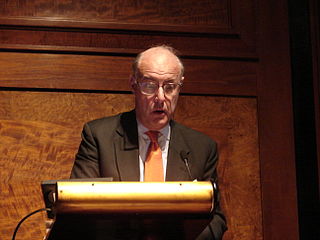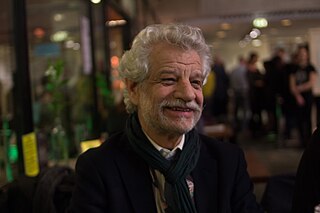
Sir David Nicholas Cannadine is a British author and historian who specialises in modern history, Britain and the history of business and philanthropy. He is currently the Dodge Professor of History at Princeton University, a visiting professor of history at Oxford University, and the editor of the Oxford Dictionary of National Biography. He was president of the British Academy between 2017 and 2021, the UK's national academy for the humanities and social sciences. He also serves as the chairman of the trustees of the National Portrait Gallery in London and vice-chair of the editorial board of Past & Present.

Peter Lunenfeld is a critic and theorist of digital media, digital humanities, and urban humanities. He is a professor and the Vice Chair of the Design Media Arts department at UCLA, director of the Institute for Technology and Aesthetics (ITA), and founder of mediawork: The Southern California New Media Group.
Visual culture is the aspect of culture expressed in visual images. Many academic fields study this subject, including cultural studies, art history, critical theory, philosophy, media studies, Deaf Studies, and anthropology.

Rebecca Newberger Goldstein is an American philosopher, novelist, and public intellectual. She has written ten books, both fiction and non-fiction. She holds a Ph.D. in philosophy of science from Princeton University, and is sometimes grouped with novelists such as Richard Powers and Alan Lightman, who create fiction that is knowledgeable of, and sympathetic toward, science.

Rosi Braidotti is a contemporary philosopher and feminist theoretician. Born in Italy, she studied in Australia and France and works in the Netherlands. Braidotti is currently Distinguished University Professor Emerita at Utrecht University, where she has taught since 1988, and Honorary Professor at RMIT University in Australia. She was professor and the founding director of Utrecht University's women's studies programme (1988–2005) and founding director of the Centre for the Humanities (2007–2016). She has been awarded honorary degrees from Helsinki (2007) and Linkoping (2013); she is a Fellow of the Australian Academy of the Humanities (FAHA) since 2009, and a Member of the Academia Europaea (MAE) since 2014. Her main publications include Nomadic Subjects (2011) and Nomadic Theory (2011), both with Columbia University Press, The Posthuman (2013), Posthuman Knowledge (2019), and Posthuman Feminism (2022) with Polity Press. In 2016, she co-edited Conflicting Humanities with Paul Gilroy, and The Posthuman Glossary in 2018 with Maria Hlavajova, both with Bloomsbury Academic.
Terry Smith is an Australian art historian, art critic and artist who currently lives and works in Pittsburgh, New York and Sydney.
Svetlana Leontief Alpers is an American art historian, also a professor, writer and critic. Her specialty is Dutch Golden Age painting, a field she revolutionized with her 1984 book The Art of Describing. She has also written on Tiepolo, Rubens, Bruegel, and Velázquez, among others.
Timon Screech was professor of the history of art at the School of Oriental and African Studies (SOAS), University of London from 1991 - 2021, when he left the UK in protest over Brexit. He is now a professor at the International Research Center for Japanese Studies (Nichibunken) in Kyoto. Screech is a specialist in the art and culture of early modern Japan.

Leonidas Donskis was a Lithuanian-Jewish philosopher, political theorist, historian of ideas, social analyst, and political commentator, professor of politics and head of "VDU Academia Cum Laude" at Vytautas Magnus University, Honorary Consul of Finland in Kaunas and deputy chairman of the Lithuanian Jewish Community. He was also the member of the European Parliament (MEP) from 2009 to 2014.
Jeffrey F. Hamburger is an American art historian specializing in medieval religious art and illuminated manuscripts. In 2000 he joined the faculty of Harvard University, where in 2008 he was appointed the Kuno Francke Professor of German Art and Culture. Hamburger received his B.A., M.A and Ph.D from Yale and has previously held professorships at Oberlin College and the University of Toronto. Elected a Fellow of the Medieval Academy in 2001, he has won numerous awards for his publications, among them: the Charles Rufus Morey Prize of the College Art Association (1999), the Roland H. Bainton Book Prize in Art & Music (1999), the Otto Gründler Prize of the International Congress on Medieval Studies (1999), the Jacques Barzun Prize in Cultural History of the American Philosophical Society (1998), the John Nicholas Brown Prize of the Medieval Academy of America (1994), and the Gustave O. Arlt Award in the Humanities of the American Council of Graduate Schools (1991). His research has been supported by fellowships from the Guggenheim Foundation, the American Philosophical Society, the Institute for Advanced Study, the National Endowment for the Humanities, the Center for Advanced Study in the Visual Arts, and the Alexander von Humboldt Foundation. In 2009 Hamburger was elected a member of the American Academy of Arts and Sciences and in 2010, of the American Philosophical Society. In 2015 he was awarded an Anneliese Maier Research Award by the Alexander von Humboldt Foundation. In 2022 he was awarded the Gutenberg Prize of the City of Mainz and the Internationale Gutenberg-Gesellschaft.

Thomas Elsaesser was a German film historian and professor of Film and Television Studies at the University of Amsterdam. He was also the writer and director of The Sun Island, a documentary essay film about his grandfather, the architect Martin Elsaesser. He was married to scholar Silvia Vega-Llona.
William A. Dyrness is an American theologian and professor of theology and culture at Fuller Theological Seminary. He teaches courses in theology, culture, and the arts, and is a founding member of the Brehm Center.
Deborah Klimburg-Salter is an art historian and emeritus professor for non-European art history at the Department of Art History of the University of Vienna. She was also director of the research platform Center for Research and Documentation of Inner and South Asia (CIRDIS). Currently she directs the project "Cultural Formation and Transformation: Shahi Art and Architecture from Afghanistan to the Western Frontier at the Dawn of the Islamic Era" financed by the Austrian Science Fund (FWF) and dedicated to transdisciplinary research.
Françoise Lionnet serves as acting chair of the Committee on Degrees in Studies of Women, Gender and Sexuality at Harvard University, where she is professor of Romance languages and literatures, comparative literature, and African and African American studies. She is distinguished research professor of comparative literature and French and Francophone studies at UCLA, and a research associate of the Centre for Indian Studies in Africa at the University of Witwatersrand, Johannesburg. She served as director of the African Studies Center and Program Co-Director of UCLA's Mellon Postdoctoral Fellowship in the Humanities: Cultures in Transnational Perspective.
Robert A. Rosenstone is an American author, historian, and Professor Emeritus of history at the California Institute of Technology. He studies the relationship between history and the visual media. He has written two books on the topic, Visions of the Past: the Challenge of Film to Our Idea of History, and History on Film / Film on History, and has edited a collection of essays, Revisioning History: Film and the Construction of a New Past. His most recent addition to the field, co-edited with Constantin Parvulescu, is A Blackwell Companion to Historical Film
Lisa E. Bloom is an American cultural critic, educator and feminist art historian specializing in polar studies, contemporary art, environmental art, history of photography, visual culture and film studies and is known for her books and essay contributions to these areas.
S. Hollis Clayson is an art historian and Bergen Evans Professor in the Humanities at Northwestern University. Her work focuses on 19th-century Europe, particularly France, as well as exchanges between France and the United States. Clayson was the founding director of Northwestern's Alice Kaplan Institute for the Humanities, serving from 2006 to 2013.
Gordon Graham is Chair of the Edinburgh Sacred Arts Foundation, Emeritus Professor of Philosophy and the Arts at Princeton Theological Seminary in the USA, and a Fellow of the Royal Society of Edinburgh, Scotland's premier academy of science and letters.
Murray Smith is a film theorist and philosopher of art based at the University of Kent, where he is Professor of Philosophy, Art, and Film and co-director of the Aesthetics Research Centre. He is the author of three books and numerous articles on film and aesthetics, and the co-editor of three collections of essays. He was President of the Society for Cognitive Studies of the Moving Image from 2014 to 2017, and has served on the editorial boards of Screen, Cinema Journal, the British Journal of Aesthetics, Projections and Series. He has held a Leverhulme Research Fellowship (2005–06), and a Laurance S Rockefeller Fellowship at Princeton University’s Centre for Human Values (2017–18). He delivered a Kracauer Lecture in 2014 at the Goethe University Frankfurt, the inaugural Beacon Institute lecture in 2015, and the Beardsley Lecture in 2018, sponsored by Temple University at the Barnes Foundation.
Anna Schober is an Austrian historian and University Professor of Visual Culture at the Institute for Cultural Analysis of the Alpen-Adria University Klagenfurt.






